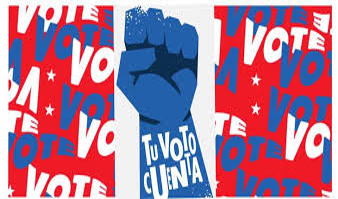Who We Are
The National Social Work Voter Mobilization Campaign works to integrate nonpartisan voter engagement into social work education and practice.
The National Social Work Voter Mobilization Campaign began in 2016 with the first launch of the VotingIsSocialWork.org website crafted by Influencing Social Policy, the Nancy A Humphreys Institute for Political Social Work and the Congressional Research Institute for Social Work and Policy with funding by the Fund for Social Policy Education and Practice. The new website and current leadership team includes the Humphreys Institute, the Silberman School of Social Work at Hunter College and Bryn Mawr Graduate School of Social Work and Social Research with many people involved in the larger task force.
What We Do
Social Work Voter Mobilization Campaign’s Goals:
- Turn Out the Vote: Voting is Social Work: General Information Flyer;
- Raise awareness of the importance and impact of voting in social work practice;
- Integrate voter engagement activities into class and field education for all social work students (bridge micro and macro practice);
- Provide information about voter mobilization skills and strategies to field instructors, students and faculty for use in agencies and the classroom; and,
- Ensure that all social workers and the people/communities they serve have access to the vote.
Why our Work Matters
Our Work puts social work’s ethics and values into practice!
Voting is a human right that provides individuals equal voice, self-determination, power within the political system, and meaningful participation in the decision-making process.
Social workers have understood the importance of voting to political action, community power and social justice dating back the Settlement House movement. Voter engagement remains still central to social work values today! Existing evidence shows that voter engagement increases individual well-being, advances civic participation, and increases social justice.1
Social Works’ Code of Ethics and CSWE Practice Standards call for social justice through action and ensuring meaningful decision making participation for all people.
By registering and encouraging people to vote, social workers:

- Improve individual well-being (micro)
- Empower individuals and communities to be decision makers (micro/mezzo)
- Strengthen organizations and communities (mezzo)
- Influence government decision making (macro)
- Secure social policies that promote social justice (macro)
- Overcome voter suppression (macro)
Field Education as a Hub for Voter Engagement
- Field is the interface between schools and agencies;
- Field has access to thousands of micro and macro students and faculty; and,
- Serves millions of highly under-represented clients and communities.
Recalling Student Voter Registration in New York City: 8,600 New Yorkers’ Registered in One Day
Bob Schachter, DSW, LMSW, Former Executive Director of NASW-NYC (1990 to 2016)
Back in 1996, in the months before the US Presidential election, I was hearing about schools of social work wanting to engage their students in voter registration. Curious about whether the schools were coordinating their efforts, I asked a member of my staff, a seasoned community organizer, to find out. She quickly discovered that there was no effort at coordination. Seeing a role for NASW, my staff member reached out to the New York Public Interest Research Group (NYPIRG) to learn how they set up tables on major thoroughfares in low income neighborhoods to do voter registration, and that NYPIRG was interested in having social work students work their tables. As a result, over 200 social work students were recruited from five schools for a one day voter registration drive in early October of that year, with a small number student activists in each school doing the recruiting.
By the end of that day, 8,600 New Yorkers had been registered to vote. NYPIRG reported that it was the most successful single day of voter registration that they had ever experienced. This approach was repeated in 2000, and although the number registered was lower, over 6,000 were registered to vote. While this experience may not be easily duplicated, I think it can serve as an inspiration for what social work students can do, and that a small number of activists can play a critical role.